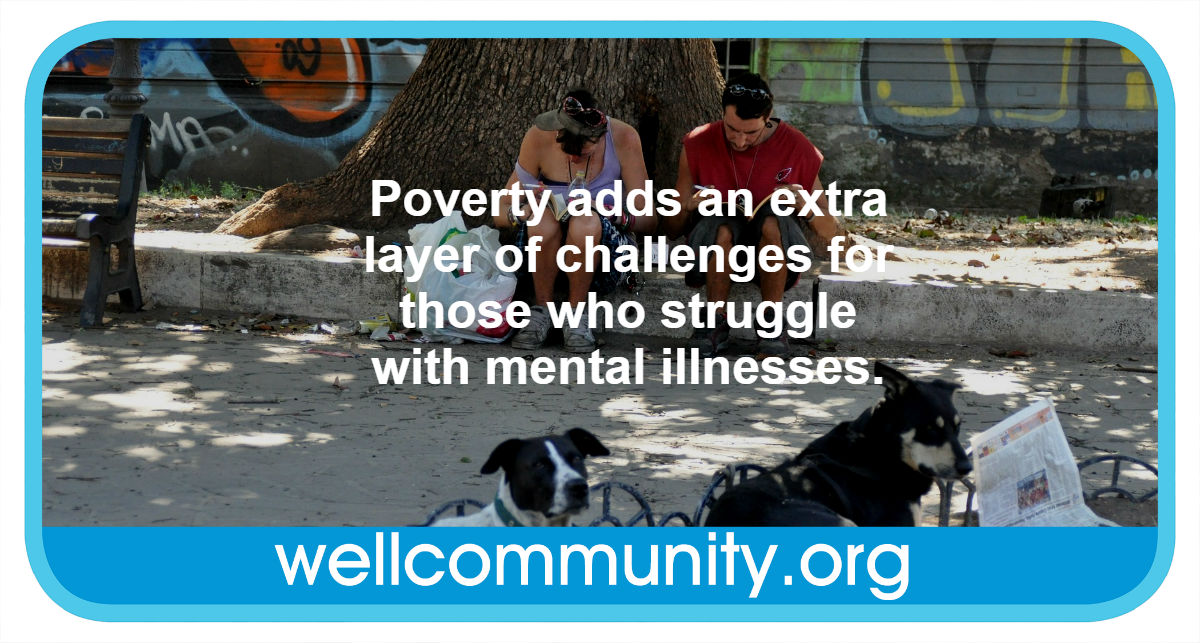
Mental illness and poverty are often deeply intertwined. According to the Substance Abuse and Mental Health Services Administration (SAMHSA), not only can living with a mental illness increase the risk of living below the poverty line, poverty can increase the likelihood that an individual will began experiencing mental health challenges and intensify the experience of mental illness.
In many ways, poverty and mental illness can contribute to one another, creating a vicious cycle that can trap those who struggle. For example, the stigma surrounding mental health conditions can prevent those who live with mental illnesses from finding employment, and living with mental health challenges can make it difficult to hold down a job, both of which dramatically increase the risk of poverty. In turn, lower-income individuals are less likely to have medical insurance that covers mental health care, and less likely to live in areas with sufficient numbers of health care providers. Without insurance coverage and access to care, treatment can be next to impossible to afford. And without treatment, the symptoms of mental illness can become even more debilitating.
“Getting help requires tenacity,” says Alice Zaccarello, Executive Director of The Well Community, explaining that poverty adds an extra layer of hurdles for those who struggle with mental illnesses. For example, making an appointment with a health care provider requires having a phone and knowing what number to dial, and keeping the appointment necessitates having money for public transportation and living close enough to a bus or train station to access that transportation. Those who are homeless need to take their possessions with them. What would be relatively simple for someone with ample income can become a multifaceted challenge for those living below the poverty line. And, when their prescriptions need to be refilled or they need to return to the doctor, they face many of the same challenges all over again.
The high rate of poverty in Dallas can make the city a particularly difficult place to live for those who struggle with mental illnesses. A December 2016 Dallas City Council briefing reported that Dallas has the highest number of people living 185 percent below the poverty line of any American city and the second highest number of people living 100 percent below the poverty line. The median income in Dallas has declined since 1989, and more than 27,300 residents live in poverty despite having full-time employment.
The dual challenges of mental illness and poverty are particularly evident in the southern Dallas, where mental health care providers are particularly lacking. An editorial published by the Dallas Morning News earlier this year called the scarcity of mental health services in the southern sector of Dallas “among the most pernicious, yet invisible, north-south gaps in the city.” Calls to the city’s 911 system related to behavioral health are far more common in southern Dallas than in the northern part of the city. Many who suffer from serious mental illnesses don’t receive any sort of professional help until their first encounter with law enforcement. Sadly, many who need care but can’t access it end up incarcerated rather than receiving the treatment they need.
In an interview published in the Dallas Morning News, former Dallas Police Chief David Brown, who was raised in Oak Cliff, spoke about the lack of mental health services in the southern sector:
Being mentally ill and poor is a devastating reality. There are no services for the mentally ill in our inner cities. The services available—you wouldn’t want to go there. And there’s the stigma, you feel embarrassed and discouraged.
Your family may take you in and put up with the behavior; they may try to get you the help. But when the help is not there or they can’t afford the help, you’re out on the street and wandering around and just doing anything to survive.
The isolation and disruption that often go hand in hand with poverty can make it difficult to take medication regularly and practice self-care. Through case management services and the support of staff and fellow members, those who are struggling can find help in solving problems and encouragement in sticking to a treatment plan. “Multiple research studies which have shown that recidivism rates for psychiatric hospitalization and incarceration have more to do with a patient’s social support system than any other factor. And The Well is a place where our members have a strong support system,” shares Alice. “Having a place to come, a place to look forward to, helps to keep members compliant with their care plans.” In addition, The Well occasionally provides bus passes for members as needed, enabling them to keep appointments, as well as helps cover the cost of medications when members don’t have sufficient funds to pay for them.
“Our members don’t talk about being poor; they don’t act poor. It’s a way of life for them,” Alice explains. “They’re used to the instability of their lives.” But, at The Well they find a place of stability and support. “When life becomes difficult, they can ask for help here. They know they can get help from The Well.”
The Well offers support and stability for those in the Dallas area who live with the dual challenges of mental illness and poverty. Your gift will help us continue to serve them.
Give now.
Be sure to follow us on Facebook and Twitter to learn more about The Well, the challenges of mental illness and poverty and how you can make a difference in the lives of those who face these challenges.
